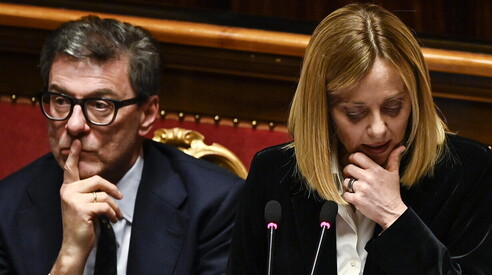The surprise of Italian stability


Ansa photo
investigation
While the specter of the IMF is being raised in France and the United Kingdom, Rome's finances are holding up, and Italy is paradoxically becoming an island of reliability in Europe. The rigorous budgets are rewarding Meloni and reversing the comparison with Paris and London.
The attempt to dramatize an already complicated situation didn't work very well. After French Prime Minister François Bayrou , who leads a minority government, announced that he would call a vote of confidence on September 8th on the €44 billion fiscal adjustment needed to contain the out-of-control deficit, Economy Minister Eric Lombard twice attempted to shake French public opinion in an interview. First, by invoking pride: "I bet that in two weeks we will pay off our debt more than the Italians," he said, referring to the progressive narrowing of the spread between France and Italy, which was once "the EU's bad student." Then, by invoking fear: "We want to avoid the risk of IMF intervention if the government falls, but I can't pretend this eventuality doesn't exist." The Economy Minister's reckless words have begun to sound like a self-fulfilling prophecy, sinking both the Paris Stock Exchange and French government bonds, further reducing the spread with Italy to below 10 points and accelerating the overtaking that – again in the minister's words – would push France "to the bottom of the 27, a position difficult to sustain for the Eurozone's second-largest economy."
After a few hours, Lombard had to make a statement to try to put out the fire he had started : “As of today, we are not threatened by any intervention, neither from the IMF, nor the ECB, nor from any international organization,” the minister wrote on X, reiterating however that – although the French economy is solid – the situation is delicate: “To think that France is, by its nature, exempt from control of its debt and sheltered from any risk is a fairy tale.”
In recent days, recourse to the IMF has also been mentioned in the United Kingdom, where the Starmer government, despite a large majority, is unable to control spending and debt. The Times, citing authoritative economists, openly spoke of the risk of a crisis similar to that of 1976, when Callaghan's then-Labour government was forced to seek a loan from the IMF. It seems absurd, but in this context, Meloni's Italy is an oasis of political and macroeconomic stability.
The international picture—first the rise in energy costs and then the rise in international trade caused by Trump's tariffs —foreshadowed the arrival of a perfect storm for an exporting country like Italy, which had a massive deficit of around 8% and an abnormally high public debt rising above 135%. Yet, just a month ago, the IMF itself—now called in to bail out France and the United Kingdom— essentially promoted Italy precisely for its fiscal policy, praising "last year's solid fiscal performance and the return to a primary surplus."
And to think that, while in Paris and London, recourse to the IMF is being used as a scarecrow, just a few years ago Giorgia Meloni indicated it as a deliberate choice had she been in government. In May 2020, the leader of the Italian Democratic Party (FdI), then in opposition to the Conte government, proposed—as an alternative to the nascent Recovery Fund—the use of the IMF's Special Drawing Rights (SDRs) to avoid being "at the mercy of the Franco-German axis." The idea was to have the IMF issue new SDRs worth approximately $1.25 trillion, to be distributed to member countries according to their participation quotas in the Fund: "Italy would benefit by approximately $40 billion, by virtue of its 3% share." The argument was that, in this way, Italy would be able to spend without any of the European conditionalities imposed by the NRRP. As we noted at the time, this would have been a catastrophe for Italy. Because the IMF's SDRs have always been intended as a tool to help developing countries, which have unreliable central banks, a history of financial instability, and difficulty servicing foreign currency debt and refinancing their debt. Therefore, for a country like Italy, such a tool would be suicidal: it would send a terrible signal to the markets, that of a country close to default.
Fortunately, or perhaps cleverly, after winning the elections, Giorgia Meloni shelved that crazy idea and, with Economy Minister Giancarlo Giorgetti, did exactly the opposite: on the one hand, she implemented the National Recovery and Resilience Plan (NRRP) as a lever to support growth while, in the meantime, securing the out-of-control public finances (especially due to the Superbonus). After four years with an average fiscal deficit of 8%, Italy returned to a primary surplus in 2024 and could already fall below the European limit of 3% this year, exiting the infringement procedure a year ahead of schedule agreed with Brussels . And all this against a backdrop of high consensus, a lack of social conflict (the CGIL general strikes are a far cry from the demonstration called by French unions to bring the country to a standstill on September 10th), and political stability: while France risks moving toward its fifth government in two years, Meloni's government is on the verge of becoming the third-longest in the history of the Republic. If the right, rather than demonstrating fiscal responsibility, had implemented its wildest ideas, perhaps today there would be talk of the possible arrival of IMF officials in Rome, as well as Paris and London.
More on these topics:
ilmanifesto





